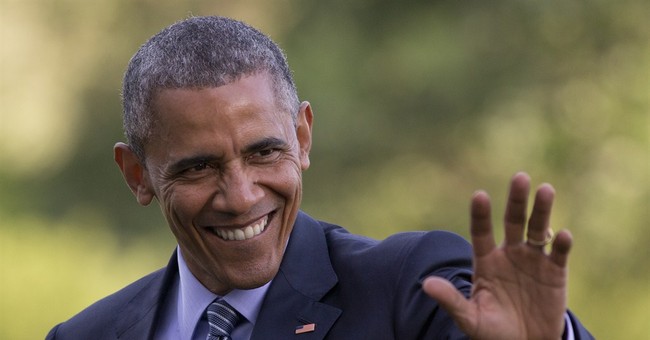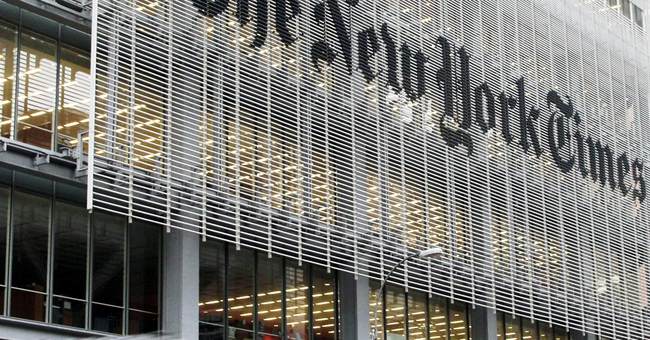
But if you can't explain both sides, how do you know you're right?
At the very least, you need to understand both the liberal and conservative positions in order to effectively understand your own.
I grew up in a liberal world -- New York, Jewish and Ivy League graduate school. I was an 8-year-old when President Dwight Eisenhower ran for re-election against the Democratic nominee, Adlai Stevenson. I knew nothing about politics and had little interest in the subject. But I well recall knowing -- knowing, not merely believing -- that Democrats were "for the little guy" and Republicans were "for the rich guys."
I voted Democrat through Jimmy Carter's election in 1976. He was the last Democrat for which I voted.
Obviously, I underwent an intellectual change. And it wasn't easy. Becoming a Republican was emotionally and psychologically like converting to another religion.
In fact, when I first voted Republican I felt as if I had abandoned the Jewish people. To be a Jew meant being a Democrat. It was that simple. It was -- and remains -- that fundamental to many American Jews' identity.
Therefore, it took a lot of thought to undergo this conversion. I had to understand both liberalism and conservatism. Indeed, I have spent a lifetime in a quest to do so.
The fruit of that quest will appear in a series of columns explaining the differences between left and right.
I hope it will benefit conservatives in better understanding why they are conservative, and enable liberals to understand why someone who deeply cares about the "little guy" holds conservative -- or what today are labeled as conservative -- views.
Difference No. 1: Is Man Basically Good?
Left-of-center doctrines hold that people are basically good. On the other side, conservative doctrines hold that man is born morally flawed -- not necessarily born evil, but surely not born good. Yes, we are born innocent -- babies don't commit crimes, after all -- but we are not born good. Whether it is the Christian belief in Original Sin or the Jewish belief that we are all born with a yetzer tov (good inclination) and a yetzer ra (bad inclination) that are in constant conflict, the root value systems of the West never held that we are naturally good.
To those who argue that we all have goodness within us, two responses:
First, no religion or ideology denies that we have goodness within us; the problem is with denying that we have badness within us. Second, it is often very challenging to express that goodness. Human goodness is like gold. It needs to be mined -- and like gold mining, mining for our goodness can be very difficult.
This so important to understanding the left-right divide because so many fundamental left-right differences emanate from this divide.
Perhaps the most obvious one is that conservatives blame those who engage in violent criminal activity for their behavior more than liberals do. Liberals argue that poverty, despair, and hopelessness cause poor people, especially poor blacks -- in which case racism is added to the list -- to riot and commit violent crimes.
Here is President Barack Obama on May 18, 2015:
"In some communities, that sense of unfairness and powerlessness has contributed to dysfunction in those communities. ... Where people don't feel a sense of hope and opportunity, then a lot of times that can fuel crime and that can fuel unrest. We've seen it in places like Baltimore and Ferguson and New York. And it has many causes -- from a basic lack of opportunity to some groups feeling unfairly targeted by their police forces."
So, poor blacks who riot and commit other acts of violence do so largely because they feel neglected and suffer from deprivations.
Since people are basically good, their acts of evil must be explained by factors beyond their control. Their behavior is not really their fault; and when conservatives blame blacks for rioting and other criminal behavior, liberals accuse them of "blaming the victim."
In the conservative view, people who do evil are to be blamed because they made bad choices -- and they did so because they either have little self-control or a dysfunctional conscience. In either case, they are to blame. That's why the vast majority of equally poor people -- black or white -- do not riot or commit violent crimes.
Likewise, many liberals believe that most of the Muslims who engage in terror do so because of the poverty and especially because of the high unemployment rate for young men in the Arab world. Yet, it turns out that most terrorists come from middle class homes. All the 9/11 terrorists came from middle- and upper-class homes. And of course Osama bin Laden was a billionaire.
Material poverty doesn't cause murder, rape or terror. Moral poverty does. That's one of the great divides between left and right. And it largely emanates from their differing views about whether human nature is innately go

The Left, on the other hand, believes that the way to a better world is almost always through doing battle with society's moral defects (real and/or as perceived by the Left). Thus, in America, the Left defines the good person as the one who fights the sexism, racism, intolerance, xenophobia, homophobia, Islamophobia and other evils that the Left believes permeate American society.
That is one reason those on the left are more preoccupied with politics than those on the right. A simple example should make this point clear. Whenever the term "activist" or "social activist" or "organizer" is used, one infers that the term refers to someone on the Left.
One consequence of this difference is that conservatives believe that good is achieved far more gradually than liberals do. The process of making a better world is largely a one-by-one-by-one effort. And it must be redone in every single generation. The noblest generation ever born still has to teach its children how to battle their natures. If it doesn't, even the best society will begin to rapidly devolve, which is exactly what conservatives believe has been happening to America since the end of World War II.
The Left does not focus on individual character development. Rather, it has always and everywhere focused on social revolution. The most revealing statement of then-presidential candidate Barack Obama, the most committed leftist ever elected president of the United States, was made just days before the 2008 election: "We are five days away from fundamentally transforming the United States of America," he told a large rapturous audience.
Conservatives not only have no interest in fundamentally transforming the United States, but they are passionately opposed to doing so. Fundamentally transforming any but the worst society -- not to mention transforming what is probably the most decent society in history -- can only make the society worse. Of course, conservatives believe that America can be improved, but not transformed, let alone fundamentally transformed.
The Founders all understood that the transformation that every generation must work on is the moral transformation of each citizen. Thus, character development was at the core of both childrearing and of young people's education at school.
As John Adams said: "Our Constitution was made only for a moral and religious people. It is wholly inadequate to the government of any other."
And in the words of Benjamin Franklin: "Only a virtuous people are capable of freedom."
Why is that? Because freedom requires self-control. Otherwise, external controls -- which means an ever more powerful government -- would have to be imposed.
The more that Leftist ideas influence society the less character education there is. Instead, children are taught to focus on social issues. For example, The Wall Street Journal just reported that Common Core, the federal standards program for elementary and high schools, has unveiled a new K-12 science curriculum, the "Next Generation of Science Standards," which will indoctrinate young Americans concerning global warming from kindergarten on.
And when they get to college, American young people will be taught about the need to fight such things as "white privilege" and the "rape culture" on their campuses.
At the same time, as a professor of philosophy wrote in The New York Times, fewer and fewer young Americans believe there are any moral truths.
Meanwhile, at home, fathers and religion, historically the two primary conveyors of moral truths and moral self-discipline, are often nonexistent.
As a result of all this, we are producing -- indeed, we have produced since World War II -- vast numbers of Americans who are passionate about carbon emissions and fighting sexism and "white privilege" who are also cheating on tests at unprecedentedly high levels.
But the age-old wisdom embraced by conservatives remains as true as ever: Before you fix society, you must first fix yourself.

One example is the minimum wage. In 1987, The New York Times editorialized against any minimum wage. The title of the editorial said it all -- "The Right Minimum Wage: $0.00."
"There's a virtual consensus among economists," wrote the Times editorial, "that the minimum wage is an idea whose time has passed. Raising the minimum wage by a substantial amount would price working poor people out of the job market . ... More important, it would increase unemployment. ... The idea of using a minimum wage to overcome poverty is old, honorable -- and fundamentally flawed."
Why did The New York Times editorialize against the minimum wage? Because it asked the conservative question: "Does it do good?"
But 27 years later, The New York Times editorial page wrote the very opposite of what it had written in 1987, and called for a major increase in the minimum wage. In that time, the page had moved further left and was now preoccupied not with what does good -- but with income inequality, which feels bad. It lamented the fact that a low hourly minimum wage had not "softened the hearts of its opponents" -- Republicans and their supporters.
As second example is affirmative action. Study after study -- and, even more important, common sense and facts -- have shown the deleterious effects that race-based affirmative action have had on black students. Lowering college admissions standards for black applicants has ensured at least two awful results.
One is that more black students fail to graduate college -- because they have too often been admitted to a college that demands more academic rigor than they were prepared for. Rather than attend a school that matches their skills, a school where they might thrive, they fail at a school where they are over-matched.
The other result is that many, if not most, black students feel a dark cloud hanging over them. They suspect that other students wonder whether they, the black students, were admitted into the college on merit or because standards were lowered.
It would seem that the last question supporters of race-based affirmative action ask is, "Does it do good?"
A third example is pacifism and other forms of "peace activism."
The left has a soft spot for pacifism -- the belief that killing another human being is always immoral. Not all leftists are pacifists, but pacifism emanates from the Left, and just about all leftists support "peace activism," "peace studies" and whatever else contains the word "peace."
The right, on the other hand, while just as desirous of peace as the left -- what conservative parent wants their child to die in battle? -- knows that pacifism and most "peace activists" increase the chances of war, not peace.
Nothing guarantees the triumph of evil like refusing to fight it. Great evil is therefore never defeated by peace activists, but by superior military might. The Allied victory in World War II is an obvious example. American military might likewise contained and ultimately ended Soviet Communism.
Supporters of pacifism, peace studies, American nuclear disarmament, American military withdrawal from countries in which it has fought -- Iraq is the most recent example -- do not ask, "Does it do good?'
Did the withdrawal of America from Iraq do good? Of course not. It only led to the rise of Islamic State with its mass murder and torture.
So, then, if in assessing what public policies to pursue, conservatives ask "Does it do good?" what question do liberals ask?
The answer is, "Does it make people -- including myself -- feel good?"
Why do liberals support a higher minimum wage if doesn't do good? Because it makes the recipients of the higher wage feel good (even if other workers lose their jobs when restaurants and other businesses that cannot afford the higher wage close down) and it makes liberals feel good about themselves: We liberals, unlike conservatives, have soft hearts.
Why do liberals support race-based affirmative action? For the same reasons. It makes the recipients feel good when they are admitted to more prestigious colleges. And it makes liberals feel good about themselves for appearing to right the wrongs of historical racism.
The same holds true for left-wing peace activism: Supporting "peace" rather than the military makes liberals feel good about themselves.
Perhaps the best example is the self-esteem movement. It has had an almost wholly negative effect on a generation of Americans raised to have high self-esteem without having earned it. They then suffer from narcissism and an incapacity to deal with life's inevitable setbacks. But self-esteem feels good.
And feelings -- not reason -- is what liberalism is largely about. Reason asks: "Does it do good?" Liberalism asks, "Does it feel good?"


No comments:
Post a Comment